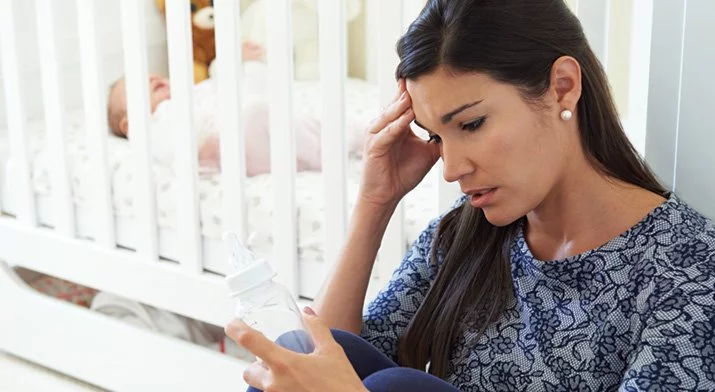Perinatal Mood and Anxiety Disorder: What happens when the pink and blue balloons fly away?
By: Christine Kowaleski, DNP, MHNP-BC
August 28, 2018
Home » Crouse Connects » Perinatal Mood and Anxiety Disorder: What happens when the pink and blue balloons fly away?

Having a baby is an exciting time that we’ve been told would fill us with joy. Much attention is given to the pregnant woman planning for the big day and preparing for the joyful arrival of the chubby-cheeked pink baby with ten little fingers and ten little toes.
Giving birth is, after all, the most natural thing to do: have a baby, breastfeed and expound with happiness.
But, what happens when a woman is anxious about her pregnancy or feels totally overwhelmed with her new role? What if the “happiest time of your life” doesn’t feel so happy? What happens when the pink and blue balloons fly away?
What is a Perinatal Mood and Anxiety Disorder or PMAD?
Perinatal Mood and Anxiety Disorder is an all-encompassing term for women who experience depression and/or anxiety during pregnancy or the first postpartum year. Historically, depression in relation to childbirth was considered only postpartum and, therefore, was called postpartum depression or PPD.
About half of the mothers who suffer from PPD state they had anxiety during pregnancy. Many say prior to their depression during the postpartum period they had feelings of anxiety and panic, which led them to depression. Therefore, the new term of Perinatal Mood and Anxiety Disorder (PMAD) was birthed.
Maternal depression and anxiety is the number one complication of pregnancy
Statistics show that 85 percent of women experience emotional disruption at some point during pregnancy or the postpartum period that is linked in many studies to hormone fluctuations, sleep disturbances, and changes in their body.
Once a baby is delivered, the mother experiences the most rapid hormone shift in her life as the hormones plummet back to a pre-pregnancy state in the first week postpartum. This shift is considered to be responsible for the “baby blues,” which is not considered a mood disorder or PMAD. Baby blues symptoms are trouble managing your emotions, feeling like you just aren’t yourself, or feeling overwhelmed, but still able to care for you and your baby. Key Point: Baby Blues are most often over by week two-three and usually do not require intervention.
One in five women experience anxiety or depression during pregnancy or postpartum
One in five women suffers from a perinatal mood or anxiety disorder. Some symptoms of perinatal mood and anxiety disorders include having intense anxiety that hits with no warning; feeling foggy and having difficulty completing tasks; feeling “robotic,” as though you are just going through the motions; have little interest in things that you used to enjoy; feel very anxious around the baby and your other children; have scary, upsetting thoughts that don’t go away; and/or feel guilty and as if you are failing at motherhood. Key Point: Mothers experiencing the symptoms of perinatal mood and anxiety disorders should seek help.
Postpartum psychosis is a medical emergency
Far less common, one to two per thousand mothers will develop postpartum psychosis. The risk is higher for women with a diagnosis of Bipolar Disorder; if you have been diagnosed with Bipolar Disorder at some point in your life be sure to let your doctor know so he/she can monitor you closely. Some symptoms of Postpartum Psychosis are: feeling out of touch with reality (you may see or hear things that other people don’t; feeling that you may hurt yourself or your baby; and/or feeling total despair and hopelessness. Key Point: Postpartum Psychosis is a medical emergency. If you experience these symptoms, you can call 911 for immediate help or the National Suicide Prevention Lifeline at 800-273-TALK (8255) for free and confidential support.
Crouse Health advocates for mothers by offering a barrier-free perinatal family support program that is open to all families (pregnant or postpartum) regardless of where they deliver their baby. Crouse’s experienced team supports the family with an approach of no shame or judgment. Services include one-to-one counseling with any family member, weekly peer support group, and integrative complimentary medicine such as yoga, massage, Reiki, and mommy movement.
Crouse providers collaborate with your physician’s office to provide a holistic approach to your care. There is no co-pay or fees for the services we provide.
Remember: If you are one of the one in five, it is not your fault and you are not alone. You will get better with help.
For help, call Dr. Kowaleski (below), at the Crouse Health Family Support Program at 315-470-7940.
Learn more about the You Are Not Alone Family Support Group
Learn more about the Perinatal Family Support Program
Christine Kowaleski, DNP, MHNP-BC specializes in Reproductive Psychiatry. She serves as the Chair of Postpartum Support International's New York Chapter.
Categories: Women's Services
Share this


